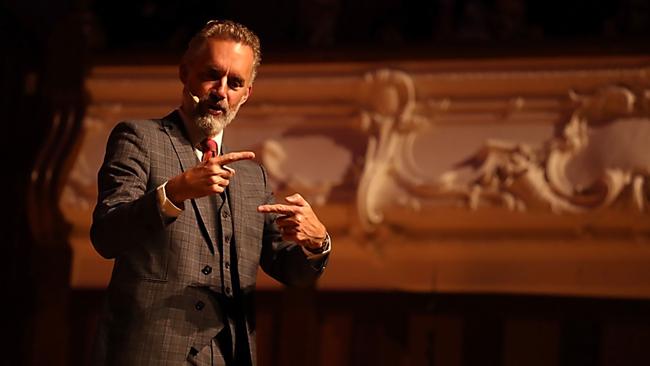Jordan Peterson’s new guide to negotiating life’s rocky path
Jordan Peterson’s new book features a chapter on how much sex you should be having if you want your marriage to last.

Jordan Peterson sent an email this week: he’s doing OK and thank you everyone for asking.
His new book is out now.
Peterson, the Canadian clinical psychologist turned self-help rock star, had planned to do some interviews by Zoom, but he is still weak from his self-described “year from hell”.
He had COVID-19 and pneumonia; and an addiction to benzodiazepines, for which he received treatment in Russia, which involved being put into a coma, after which his fingers started skidding all over the keyboard and he had to teach himself to walk again.
During the one Zoom interview he has so far managed to do with The Times of London, he broke down.
So, for now, he has offered up his book for review and guess what? There is a chapter about romance. Also, how much sex you should be having if you want your marriage to last. Bet you didn’t expect that, did you?
TRAUMA & RECOVERY: Read our exclusive extract of Jordan Peterson’s 12 More Rules for Life
But it makes sense because if there is one message Peterson would like to get across right now, it’s that none of us — not you, not him — can do this alone. Life is brutal, and it’s really only our relationships with other people — and the honest one with our own selves — that make our otherwise painful existence bearable.
Peterson dedicates the book — Beyond Order: 12 More Rules For Life — to his wife Tammy “whom I have loved deeply for fifty years”.
He gives a hat tip also to his children, his granddaughter, his physicians and his friends as he recounts some of the horror of the previous 18 months, including the difficulties imposed on people of this planet by COVID-19.
But this is not a book about coping with the pandemic.
It is a romp through the ages, and popular culture: you will find Harry Potter, the Gospel stories; Disney’s Pocahontas; the wolf pack, the elder gods of Mesopotamia; JRR Tolkien; Pinocchio; Dr Peterson’s father-in-law; Williams Blake and Wordsworth; wildebeests and the Kingdom of God
But it is rule No 10 — finding ways to keep your marriage alive — that Peterson cites as among the most important.
“Life is too difficult to negotiate alone,” he says. Yet it’s so difficult to get along with other people!
Rule No 1 for saving your marriage, perhaps paradoxically, is: have the fight.
To illustrate, Peterson recounts the tale of the wife who allows “so-called minor irritations” (which are not in fact minor if they happen day after day) to continue for years. One day she explodes.
“Do not pretend you are happy with something if you are not, and if a reasonable solution might, in principle, be negotiated,” Peterson writes. “Have the damn fight, unpleasant as that might be in the moment.”
If you don’t, “every little problem you have, every morning, afternoon, or evening with your spouse will be repeated … every trivial but chronic disagreement about cooking, dishes, housecleaning, responsibility for finances, or frequency of intimate contact will be duplicated, over and over.”
Then your marriage will end. You need to say what you want — and you need to listen to what your partner wants from you.
Which brings us to sex. “What do you owe each other sexually if you are entangled in a marriage?” Peterson writes. “The answer is not ‘no sex’.”
Nor — sorry here to all the ladies who love it — is the answer sex 15 times a day, and “it is probably not sex begrudgingly once a year. It is somewhere between extremes, and that is where you must begin to negotiate.”
Once, twice or three times a week seems reasonable to Peterson (he notes that three times a week might be a lofty goal for those who have been married a long time.) But once or twice, “if handled well, seems to work out acceptably for both partners. Twice is better than once, but once is much better than zero.
“Zero is bad. If you go to zero, then one of you is tyrannising the other, and the other is submitting. If you go to zero, then one of you is going to have an affair … I do not say that lightly.”
New lovers won’t find it difficult to have sex twice a week, but couples with two careers, two kids and two decades of matrimony behind them almost certainly will because “maybe there is a list of ten things you will do in a day, and sex is number eleven”.
But you still need to agree on what will keep each of you satisfied, meaning: seen and understood. Maybe you’re thinking no, it’s too late. I chose the wrong person and we just don’t get along.
Peterson says “there are seven billion people in the world. At least a hundred million, let us say, might have made good partners for you. You are not going to get along with any partner — not easily, unless you agree to be tyrannised and silent, and even then, you will take your revenge.
“You are different people. And not only are you different from your partner, but you are rife with inadequacies and so is he — or she.”
Now, it’s true, sometimes, a person will find themselves married to a psychopathic brute, “a congenital and incorrigible liar, a criminal, an alcoholic, a sadist, and maybe all five at once”.
“Then you must escape,” Peterson writes, as you might a hurricane. But if it’s simply the case that the marriage has become unbelievably tedious and frustrating, it may yet be salvageable.
“A marriage is a vow, and there is a reason for it,” Peterson writes. “You announce jointly, publicly: ‘I am not going to leave you, in sickness or health, in poverty or wealth — and you are not going to leave me’. It is actually a threat: ‘We are not getting rid of each other, no matter what’.”
Having “no escape hatch” creates a set of circumstances in which the couple must learn to negotiate. In so doing, they mature into less selfish people.
Peterson knows, of course, that he has not been particularly good at living up to these rules for life, especially in recent times. He is well aware — and notes with amusement — the meme that goes around the internet: a clip of Peterson in his office “with a fair bit of mess in the background, and I cannot say that I look much better myself”.
“Who am I to tell people to clean up their rooms before attempting to fix the rest of the world when, apparently, I cannot do it myself?”
He is speaking here not only about his desk but also his own physical and mental health. How did everything go so spectacularly wrong?
Peterson does not yet know the answer to that question — he was unbearably stressed by factors both internal and external — and he says that he personally found rule No 12 from the new book — “Be grateful despite your suffering” — the most difficult to implement.
“I have been sorely tempted towards bitterness,” he writes, as he confronted Tammy’s illness and his own. He thought at times that he might die, and she might, too. There were times when each was in agony.
“I am not going to cheapen any of that by claiming that we became better people for living through it,” he said.
But he notes that all human being “have sources of strength upon which you can draw, and even though they may not work well, they may be enough.
“You have your own character and courage, and if those have been beat to a bloody pulp … you have the character and courage of those for whom you care and who care for you.
“And maybe, just maybe, with all that, you can get through.”





To join the conversation, please log in. Don't have an account? Register
Join the conversation, you are commenting as Logout